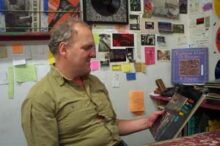
Bob knows vinyl. And anyone in Portland with a turntable knows Bob. Since 1987 Bob has owned and operated Enterprise Records across from Congress Square at 613 Congress St. Since that first year in business, Bob has supported, and even worked at, WMPG. And so, during Enterprise Records 15th year, we at WMPG would like to celebrate the man, the store, and the institution that they have become. And to thank him for his extraordinary support of another institution, WMPG. It hasn’t always been easy for either of us.
Recently, I had the distinct pleasure and honor to spend a few minutes with Portland’s King of the LP in the inner sanctum of Enterprise Records. Among neatly filed shelves of back-stock in a tiny office, I learned of the sometimes bumpy arc that is the history of the store, interrupted occasionally but politely by staff picking Bob’s brain to answer questions such as “Do we have any re-issues of this Fairport Convention album?” and “What would you recommend as the seminal Fairport record?” “How much for the Nick Drake box set that just came in?” Bob knows his stuff and was quick to locate the re-issue and answer the questions (“Liege and Lief” and “a hundred bucks”) while continuing with my interview. He gave the impression that he would rather not grab attention for what he does, but he was genuinely touched that Enterprise’s longevity was marked with an anniversary celebration recently at the Skinny. It was an event that he says caught him somewhat off-guard. You do something for so many years, he said, and you don’t realize the impression it has had on people until you reach a milestone like 15 years in business.
Bob entered the record business for no reason other than it seemed like a fun business to run. At the time, Bob was a volunteer DJ at an upstart community radio station on the USM Gorham campus called WMPG. The staff, he related, was “maybe two or three core people and an extended group of 25 people at most.” It was before the days of 24 hour programming and Bob would sign on the station at 6:00 am with the immortal line, “broadcasting with the power of a light bulb,” and play an eclectic mix of “rock, jazz, anything. It was completely free-form. My show was called the Grey Zone.” He would spin tunes until 9:00 am or until his replacement would, hopefully, show up. Many times Bob had to stay on the air until noon or later and several times he had to sign off the station because no one showed before he had to leave. He worked the radio gig for about a year, eventually leaving to devote more time to his fledgling business in Portland.
Timing, as they say, is everything. In 1987, when Enterprise Records opened, records still dominated the music business. Compact Discs were a rumor on the horizon. It was a horizon that approached very quickly. Soon CDs were dominating the industry, but Bob wasn¹t worried. “It didn’t take a PhD in economics to know that CDs were going to be a cost-driven entity. I figured that people interested in convenience would go to CDs but people who like music like records.” Unfortunately, so many people were interested in convenience that by the early 90s, Enterprise Records was struggling mightily. A lot of people were selling their records after replacing them with CDs, but Bob found that mostly he was getting very mainstream records brought into his store “Everyone brought in their Beatles records, and Rolling Stones, and stuff you see all the time.” People were selling but very few were buying. “People thought my store was a joke. Really. People wondered what I was doing.” There were still “diehard, selective customers” but Bob knew he had to adjust with the times. Selling CDs was not an option. “People were asking about CDs, but they were always asking me for strange things. Like did I have the Sex Pistols ŒNever Mind the Bollocks¹ on CD? Like the sound quality of that CD would be better than vinyl.” And the hassles of keeping up with musical trends didn¹t interest Bob. “Can you imagine trying to keep up with what’s popular in new music all the time?” he asked. “And it¹s so price-driven that a little store gets undercut by the big chains.” He changed in other ways, “I brought in more stuff like pop vocals. I still don’t hardly sell any pop vocals, but I brought it in and expanded what I carry.” And then a funny thing happened on the musical landscape.
With the popularity of rap and hip-hop and the penchant for artists to sample cuts from old vinyl, Bob saw his customer base expand to include younger and younger vinyl-philes. “The rap and hip-hop stars were into vinyl, so, naturally, the kids want to be cool like them, and they started getting into records.” And to this day, a good number of Bob’s customers are high school and college students. And the hard-core collector types are still coming in, as well.
I assumed Bob’s interest in the business evolved out of a record collecting hobby. “No. I¹ve never been a collector. I have a pile of records at home, but I don¹t think any serious collector would make any sense out of it. I have some jazz, some rock, some of a lot of stuff. A collector is someone who focuses on, say, Jazz records from this year to that year, or something like that. A collection has some continuity.” And where, I wondered, does Bob find records to sell? Obviously, a fair number are brought into his store (including a collection of some 400 LPs that he was sorting through when I walked in), and I know there are lots of record sales and shows. At this question, Bob put on his poker face. “I¹ll tell you what I tell anyone that asks me that question: I get them anywhere but yard sales. Anywhere but yard sales.” At that point Bob excused himself. “Is that enough? Do you have enough to write your piece? I have to get back out there. That guy’s a special needs customer.” And Bob strolled back out to do what he does so well sell some records.
All of this record talk got me nostalgic for my old LPs and the album art and the lovely mechanics of needle on vinyl. A serious case of “you don’t know what you’ve got ’til it’s gone.”


